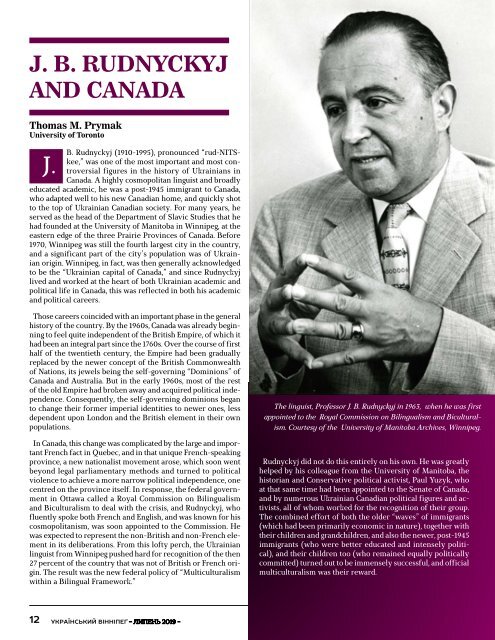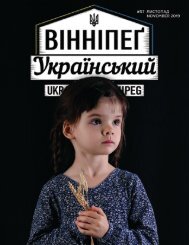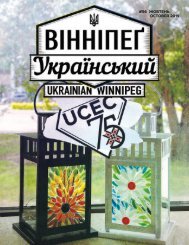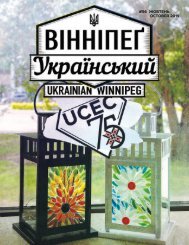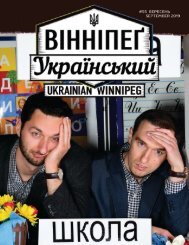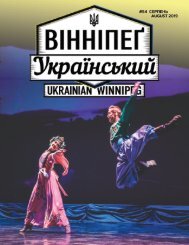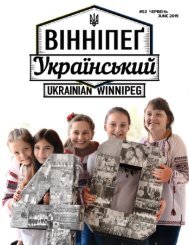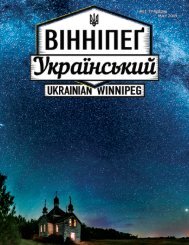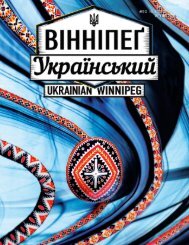Вінніпеґ Український № 7 (53) (July 2019)
You also want an ePaper? Increase the reach of your titles
YUMPU automatically turns print PDFs into web optimized ePapers that Google loves.
J. B. RUDNYCKYJ<br />
AND CANADA<br />
Thomas M. Prymak<br />
University of Toronto<br />
J.<br />
B. Rudnyckyj (1910-1995), pronounced “rud-NITSkee,”<br />
was one of the most important and most controversial<br />
figures in the history of Ukrainians in<br />
Canada. A highly cosmopolitan linguist and broadly<br />
educated academic, he was a post-1945 immigrant to Canada,<br />
who adapted well to his new Canadian home, and quickly shot<br />
to the top of Ukrainian Canadian society. For many years, he<br />
served as the head of the Department of Slavic Studies that he<br />
had founded at the University of Manitoba in Winnipeg, at the<br />
eastern edge of the three Prairie Provinces of Canada. Before<br />
1970, Winnipeg was still the fourth largest city in the country,<br />
and a significant part of the city’s population was of Ukrainian<br />
origin. Winnipeg, in fact, was then generally acknowledged<br />
to be the “Ukrainian capital of Canada,” and since Rudnyckyj<br />
lived and worked at the heart of both Ukrainian academic and<br />
political life in Canada, this was reflected in both his academic<br />
and political careers.<br />
Those careers coincided with an important phase in the general<br />
history of the country. By the 1960s, Canada was already beginning<br />
to feel quite independent of the British Empire, of which it<br />
had been an integral part since the 1760s. Over the course of first<br />
half of the twentieth century, the Empire had been gradually<br />
replaced by the newer concept of the British Commonwealth<br />
of Nations, its jewels being the self-governing “Dominions” of<br />
Canada and Australia. But in the early 1960s, most of the rest<br />
of the old Empire had broken away and acquired political independence.<br />
Consequently, the self-governing dominions began<br />
to change their former imperial identities to newer ones, less<br />
dependent upon London and the British element in their own<br />
populations.<br />
In Canada, this change was complicated by the large and important<br />
French fact in Quebec, and in that unique French-speaking<br />
province, a new nationalist movement arose, which soon went<br />
beyond legal parliamentary methods and turned to political<br />
violence to achieve a more narrow political independence, one<br />
centred on the province itself. In response, the federal government<br />
in Ottawa called a Royal Commission on Bilingualism<br />
and Biculturalism to deal with the crisis, and Rudnyckyj, who<br />
fluently spoke both French and English, and was known for his<br />
cosmopolitanism, was soon appointed to the Commission. He<br />
was expected to represent the non-British and non-French element<br />
in its deliberations. From this lofty perch, the Ukrainian<br />
linguist from Winnipeg pushed hard for recognition of the then<br />
27 percent of the country that was not of British or French origin.<br />
The result was the new federal policy of “Multiculturalism<br />
within a Bilingual Framework.”<br />
The linguist, Professor J. B. Rudnyckyj in 1963, when he was first<br />
appointed to the Royal Commission on Bilingualism and Biculturalism.<br />
Courtesy of the University of Manitoba Archives, Winnipeg.<br />
Rudnyckyj did not do this entirely on his own. He was greatly<br />
helped by his colleague from the University of Manitoba, the<br />
historian and Conservative political activist, Paul Yuzyk, who<br />
at that same time had been appointed to the Senate of Canada,<br />
and by numerous Ukrainian Canadian political figures and activists,<br />
all of whom worked for the recognition of their group.<br />
The combined effort of both the older “waves” of immigrants<br />
(which had been primarily economic in nature), together with<br />
their children and grandchildren, and also the newer, post-1945<br />
immigrants (who were better educated and intensely political),<br />
and their children too (who remained equally politically<br />
committed) turned out to be immensely successful, and official<br />
multiculturalism was their reward.<br />
Moreover, there is no doubt whatsoever that it was the Ukrainians,<br />
more than any other “ethnic group” that led the charge in this battle for<br />
multiculturalism. They presented more briefs to the Royal Commission<br />
than did any other group, they pushed harder for changes than did anyone<br />
else, and their youth protested and demonstrated for their cause more<br />
effectively than did the youth of any other group. Throughout the entire<br />
history of the Ukrainian group in Canada, in fact, multiculturalism was<br />
probably its single most important political achievement. And Jaroslav<br />
Rudnyckyj stood at the very centre of this great effort.<br />
But politics was not Rudnyckyj’s main interest. Rather he was primarily<br />
a scholar, and he always remained at heart a linguist, or a “philologist.”<br />
Although he knew many languages well, he specialized in the Ukrainian<br />
language and its varied dialects, and he did a great deal of research into<br />
the origin of Ukrainian words, especially personal and place names. He<br />
also made significant contributions to the history of Ukrainian literature,<br />
to library studies, and to Ukrainian bibliography. Moreover, when he first<br />
arrived in western Canada, he was fascinated by the language of those<br />
earlier Ukrainian pioneers, which, for over half a century, had missed a<br />
revolution and two world wars and developed independently from that<br />
in the Old Country, and consequently, had acquired a distinctiveness all<br />
its own. This led him to the study of Ukrainian folklore in Canada, and he<br />
contributed enormously to the establishment of that new field as well.<br />
On another level, Rudnyckyj was an enthusiastic scholar with enormous<br />
self-confidence and great teaching abilities and was able to inspire an<br />
entire generation of students to carry on his legacy. His graduate students<br />
found positions (some in academia, and some elsewhere) across North<br />
America, and they continued his work for years afterwards. In fact, the<br />
tradition of academic study of the Ukrainian Canadians, which had been<br />
inspired and developed by the linguist Rudnyckyj (and augmented by<br />
his contemporaries and colleagues, also post-1945ers, like the historian,<br />
Mykhailo Marunchak in Winnipeg and the poet Yar Slavutych in Edmonton)<br />
stood in clear contrast to the situation in the United States, where<br />
no such tradition was ever clearly established, and where academic<br />
institutions such as the Harvard Ukrainian Research Institute generally<br />
ignored the history of the community that had funded and founded it.<br />
Professor Jurij Darewych of Toronto, a former Rudnyckyj student, tells<br />
an interesting story about the nature of Rudnyckyj’s interest in the language<br />
of the children and grandchildren of those old Ukrainian Canadian<br />
pioneers. He stressed the professor’s great sense of humour and once told<br />
me about several examples of items that Rudnyckyj had collected over<br />
the years. And these examples too were not without a certain degree of<br />
humour. They linked language to folklore, and they included the unusual<br />
political expression: “Vin bezhyt na maioru.”<br />
12 <strong>Український</strong> <strong>Вінніпеґ</strong> - ЛИПЕНЬ <strong>2019</strong> -<br />
- JULY <strong>2019</strong> - UKRAINIAN WINNIPEG 13


